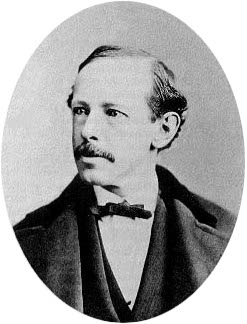Horatio Alger, Author
By Barbara Schock
As soon as he was old enough,
Carl Sandburg applied for a card at the Galesburg
public library. He read a variety of books written
for young boys. Among them were a number written
by Horatio Alger. The books were similar in that
they told the same story of an orphan who by luck
and pluck achieved success in his life.
Horatio Alger, Jr., was born January 13, 1832, in
Chelsea, Massachusetts. His father was a Unitarian
clergyman. They were descendants of numerous
Plymouth Pilgrim families.
As Horatio was the eldest son, his father tutored
him in classical studies and allowed his son to
observe his work as a minister. At the age of
sixteen the boy passed the entrance examination to
Harvard University. In 1852, Alger graduated with
the honor of Phi Beta Kappa.
Alger had written for local publications during
his youth. He wanted to be a writer, but was
unsuccessful. After working as an editor and
teacher, he entered the Harvard Divinity School
and graduated in 1862. At his first pastorate for
the Unitarian church in Brewster, Massachusetts,
he was investigated for over familiarity with
boys.
In 1866, Alger moved to New York City and lived
there for the next thirty years. He began to write
for Student and Schoolmate, a monthly magazine for
boys. Following the Civil War there were thousands
of abandoned children on the streets of New York.
Some had lost their fathers in the war and others
had been left to take care of themselves. Alger
became interested in the welfare of these
children. He adopted several over the years.
He wrote the story of Ragged Dick, a poor
bootblack, which was serialized in Student and
Schoolmate beginning in January, 1867. It became
very popular and was expanded into a book. A
series of books about the same character were
later published. Other books followed with
different characters, but the story line was
always the same; hard work will bring success.
The last three years of his life, Alger lived with
his sister in South Natick, Massachusetts. He had
estimated his income from all of his books to be
$100,000 between 1866 and 1896 (equal to $2.3
million in today’s dollars). His will made small
bequests to family and a few friends and requested
his letters and papers be destroyed.
After Horatio Alger’s death in 1899, there was
renewed popularity of his books for several
decades. The social and economic events of the
1920s did away with public interest in Alger’s
books. Most of them are now out of print.
Today, the nearly one hundred stories by Horatio
Alger are mocked as too good to be true. But,
there is an element of truth in the resilience and
willingness to work hard among American youth.
Carl Sandburg grew up in a family which was poor.
He worked at all kinds of jobs. He traveled as a
hobo as well as a stereoscopic picture salesman.
He wrote poems and prose pieces for years before
they were recognized by the public. The story of
his life can be viewed as something of an Horatio
Alger narrative.
|
|
|
| Date | Title |
| June 3, 2013 | Horatio Alger, Author |
| May 27, 2013 | Memorial Day, 1887 |
| May 20, 2013 | Professor Jon W. Grubb |
| May 13, 2013 | Beginnings of Lombard University |
| May 6, 2013 | Young Sandburg’s View of Lombard College |
| April 29, 2013 | Thinking |
| April 22, 2013 | Robert Colville, Master Mechanic |
| April 15, 2013 | The Galesburg Opera House |
| April 8, 2013 | Grocery Stores and Sample Rooms |
| April 1, 2013 | A Hearty Breakfast |
| March 25, 2013 | The Lost Wallpaper Legend |
| March 18, 2013 | Martin G. Sandburg |
| March 4, 2013 | The Edison Talking Machine |
| February 25, 2013 | Joe Elser, Civil War Veteran |
| February 18, 2013 | Remember the Maine... |
| February 11, 2013 | Lincoln's Birthday |
| February 4, 2013 | Curiosity |
